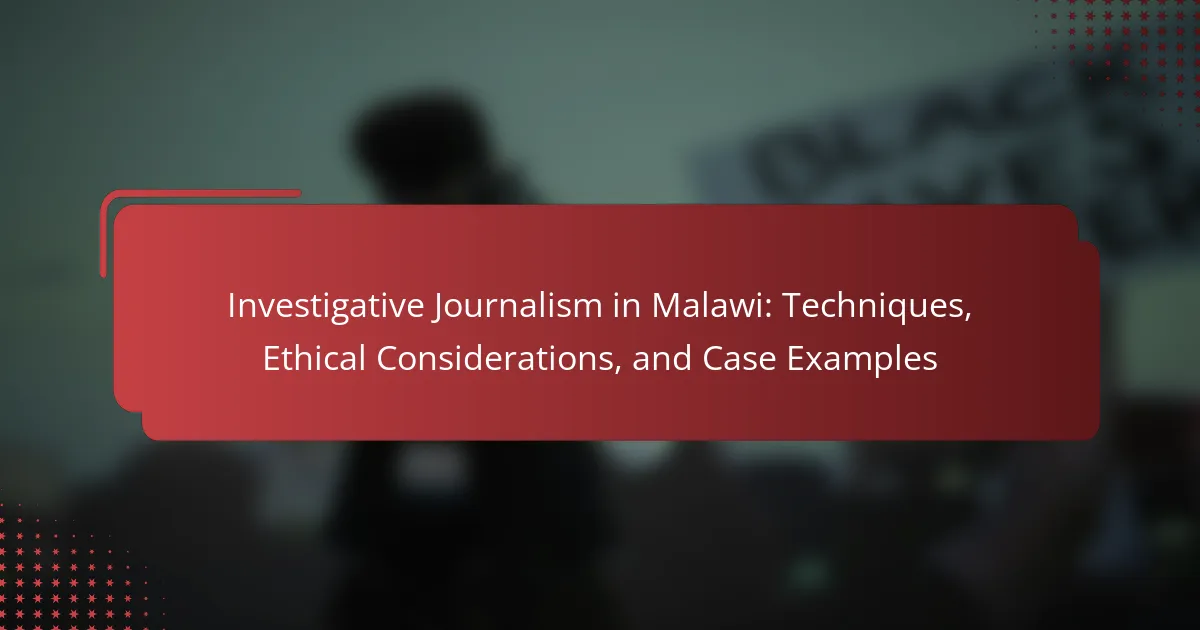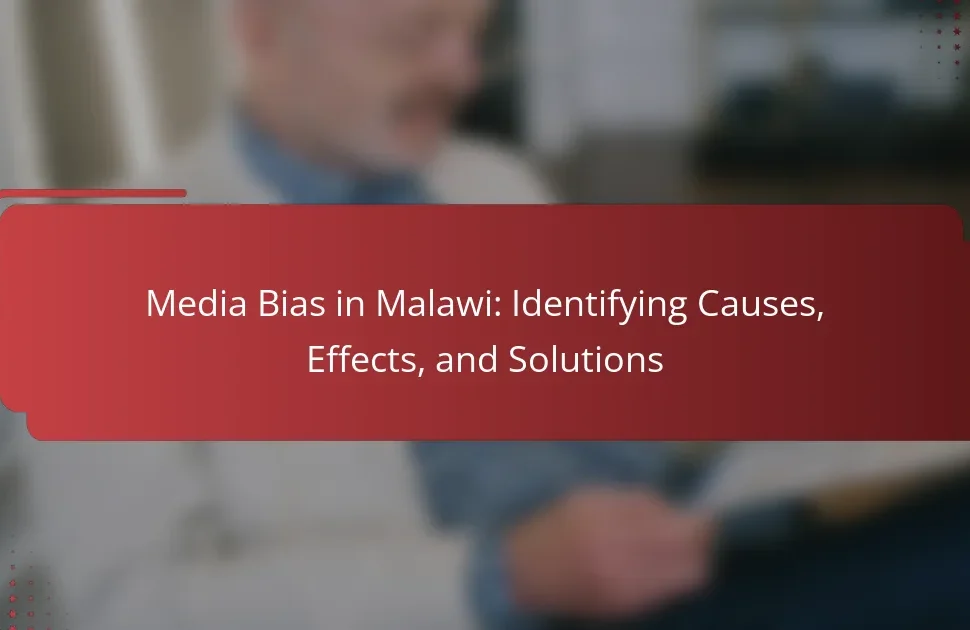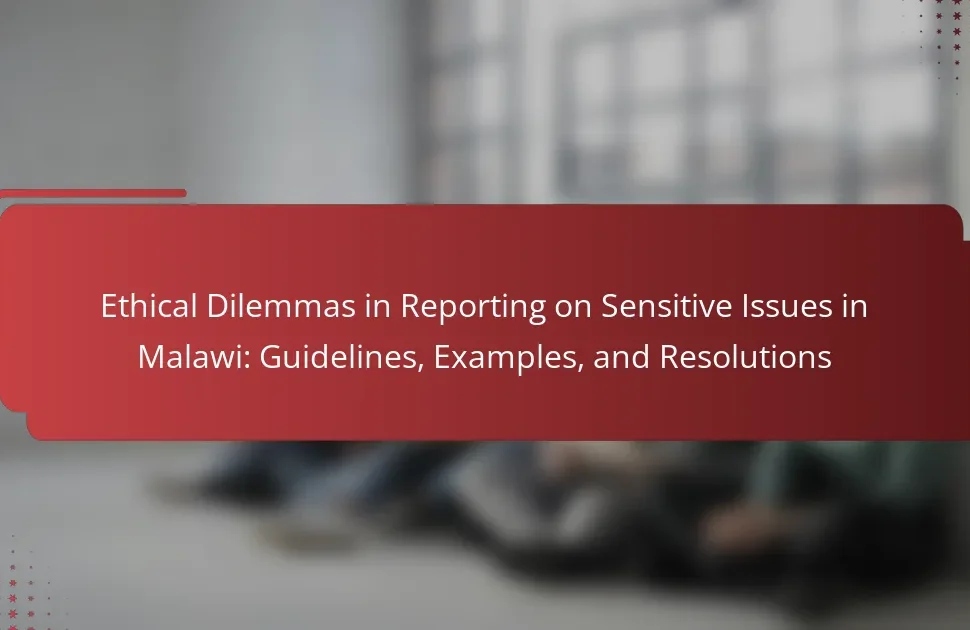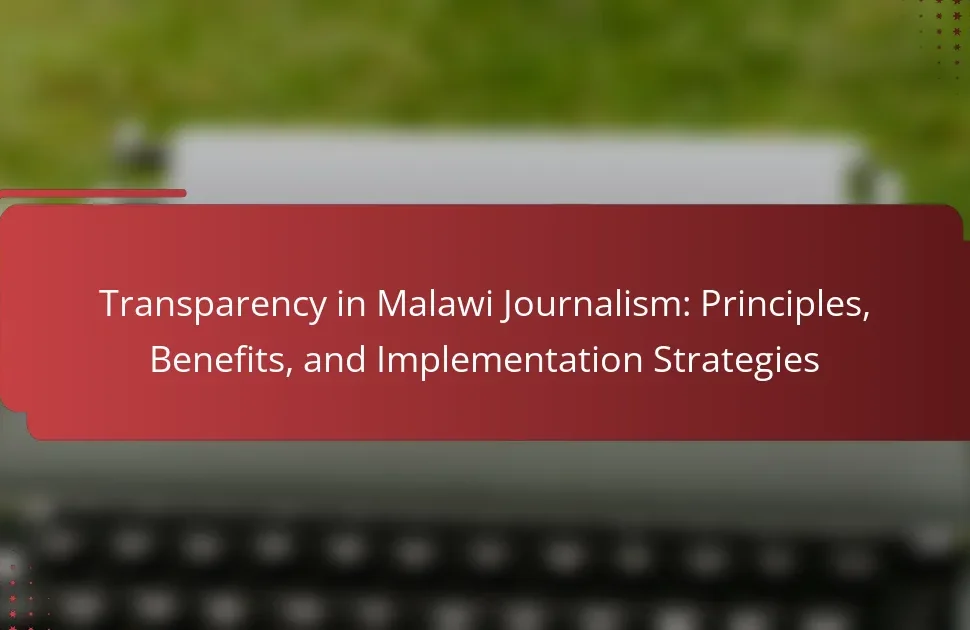Investigative journalism in Malawi is a critical practice aimed at uncovering hidden truths and exposing wrongdoing, particularly in areas such as corruption, human rights abuses, and environmental issues. Journalists utilize various techniques, including in-depth interviews, document analysis, and field investigations, to gather information and hold powerful entities accountable. Ethical considerations play a significant role in this field, emphasizing accuracy, source protection, and responsible reporting. Notable case examples, such as the 2011 cashgate scandal and illegal logging activities, illustrate the impact of investigative journalism on public awareness and policy change in Malawi. This article examines the techniques, ethical frameworks, and significant cases that define investigative journalism in the country.
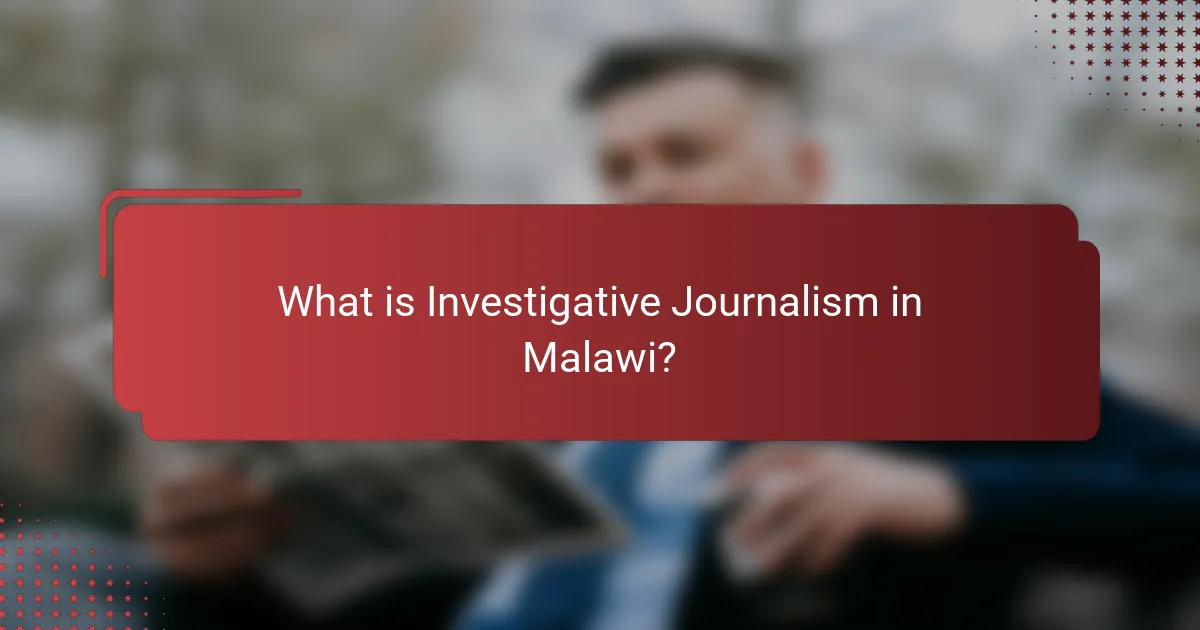
What is Investigative Journalism in Malawi?
Investigative journalism in Malawi is a form of journalism that seeks to uncover hidden truths and expose wrongdoing. This type of journalism often focuses on issues such as corruption, human rights abuses, and environmental concerns. Journalists in Malawi employ various techniques, including in-depth research, interviews, and data analysis, to gather information. They aim to inform the public and hold powerful entities accountable. The work of investigative journalists in Malawi has led to significant revelations, influencing public policy and societal change. For instance, notable cases have brought attention to government corruption and mismanagement of resources.
How does investigative journalism differ from other forms of journalism in Malawi?
Investigative journalism in Malawi differs from other forms of journalism primarily in its depth of research and focus on uncovering hidden truths. It involves extensive fact-checking, interviews, and analysis of documents. This form of journalism aims to expose corruption, human rights abuses, and social injustices. Other journalism types, like news reporting, often provide surface-level coverage of events without in-depth investigation. Investigative journalists in Malawi often face significant risks, including threats and legal challenges, which are less common in standard reporting. The impact of investigative journalism can lead to policy changes and increased public awareness, demonstrating its crucial role in a democratic society.
What are the key characteristics of investigative journalism?
Investigative journalism is characterized by in-depth research and analysis. It seeks to uncover hidden truths and expose wrongdoing. Journalists often rely on multiple sources and documents. They use interviews to gather firsthand accounts. This type of journalism emphasizes accountability and transparency. Investigative pieces can take months or years to complete. They often reveal issues of public interest, such as corruption or abuse of power. Historical examples show that investigative journalism has led to significant social change.
Why is investigative journalism important in the Malawian context?
Investigative journalism is crucial in Malawi as it promotes transparency and accountability. It uncovers corruption and abuse of power within government and institutions. This form of journalism helps inform the public about critical issues affecting their lives. In Malawi, where governance challenges persist, investigative reporting plays a vital role in holding leaders accountable. For instance, the 2019 report by the Malawi Human Rights Commission highlighted various human rights abuses, showcasing the need for investigative efforts. Furthermore, investigative journalism can lead to reforms and policy changes, benefiting society at large. It empowers citizens by providing them with the information needed to engage in civic activities. Overall, investigative journalism is essential for fostering a democratic society in Malawi.
What are the historical developments of investigative journalism in Malawi?
Investigative journalism in Malawi has evolved significantly since the country’s independence in 1964. Initially, it faced challenges under a one-party state led by Hastings Banda, where censorship and repression were prevalent. The 1990s marked a turning point with the introduction of multiparty democracy. This shift allowed for greater press freedom and the emergence of independent media outlets.
In the early 2000s, investigative journalism began to gain traction, focusing on issues such as corruption and human rights abuses. Notable cases included investigations into government mismanagement and public resource allocation. The establishment of organizations like the Media Institute of Southern Africa (MISA) further supported journalists in their efforts to report critically on governance.
By the 2010s, digital platforms began to play a crucial role in investigative reporting. Journalists utilized social media to disseminate information rapidly and engage with the public. Despite ongoing challenges, such as threats to press freedom and safety concerns, investigative journalism in Malawi continues to be a vital tool for accountability and transparency in governance.
How has the political landscape influenced investigative journalism?
The political landscape significantly influences investigative journalism by shaping its environment and accessibility. In Malawi, political stability or turmoil directly impacts journalists’ ability to operate freely. For instance, during periods of political repression, investigative journalists face threats, censorship, and intimidation. This climate can stifle critical reporting on government corruption and human rights abuses. Conversely, a more open political environment encourages robust investigative work, as seen during democratic transitions. Historical events, such as the 2014 elections, showcased increased investigative efforts due to a more favorable political climate. Ultimately, the political context determines the risks and opportunities for investigative journalism in Malawi.
What major milestones have shaped the practice in Malawi?
Major milestones that have shaped investigative journalism in Malawi include the establishment of the Malawi Human Rights Commission in 1998. This commission has promoted press freedom and accountability. In 2006, the Access to Information Bill was introduced, enhancing transparency and facilitating investigative work. The 2014 elections saw increased scrutiny of government actions, leading to more rigorous journalistic practices. Additionally, the formation of the Media Institute of Southern Africa in Malawi has supported training and capacity building for journalists. These developments have collectively strengthened the investigative journalism landscape in the country.
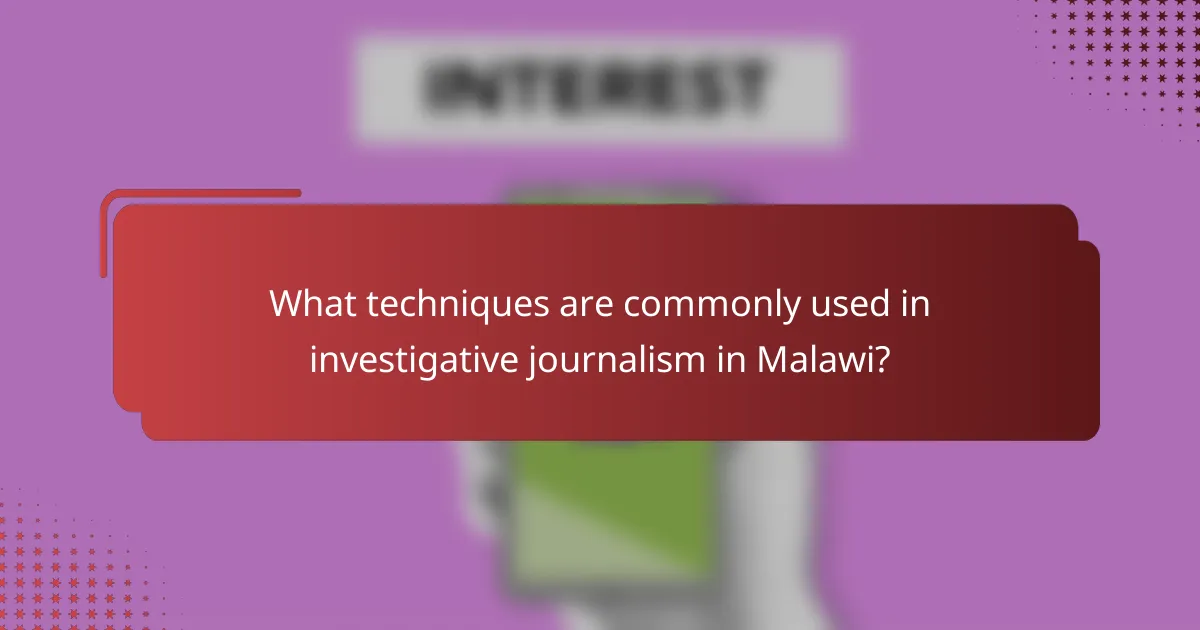
What techniques are commonly used in investigative journalism in Malawi?
Investigative journalism in Malawi commonly employs techniques such as in-depth interviews, document analysis, and field investigations. In-depth interviews allow journalists to gather firsthand accounts from sources with relevant information. Document analysis involves scrutinizing public records, reports, and official documents to uncover truths. Field investigations enable journalists to observe events or conditions directly, providing context and evidence. Additionally, collaboration with local communities enhances the information-gathering process. These techniques are vital for exposing corruption and human rights abuses in Malawi.
How do investigative journalists gather information?
Investigative journalists gather information through various methods. They conduct interviews with sources to obtain firsthand accounts. They also utilize public records to uncover facts and data. Observational techniques are employed to witness events and gather evidence. Journalists often analyze documents for inconsistencies or hidden information. Networking with other professionals can provide valuable insights. They may use online research to access databases and archives. Collaboration with whistleblowers can lead to significant revelations. These methods collectively enhance the accuracy and depth of investigative reporting.
What role does public records access play in investigations?
Public records access is crucial in investigations as it provides transparency and accountability. Investigative journalists rely on these records to gather evidence and verify facts. Access to public documents such as court records, property records, and government reports enables journalists to uncover hidden information. This information can reveal patterns of corruption or misconduct. For example, in Malawi, public records have helped expose mismanagement of funds in government projects. The Freedom of Information Act in Malawi supports this access, allowing journalists to request necessary documents. Overall, public records serve as a foundational tool in the investigative process.
How do interviews contribute to investigative reporting?
Interviews are crucial for investigative reporting as they provide firsthand accounts and insights. They allow journalists to gather information directly from sources involved in the story. This process can uncover hidden facts and reveal perspectives that are not available through documents or public records. Interviews often serve as a means to verify information obtained from other sources. They enhance the depth and credibility of the reporting by including diverse viewpoints. In investigative journalism, interviews can lead to the discovery of new leads and evidence. They help journalists build a narrative that is informed by real experiences and testimonies. Ultimately, interviews are instrumental in creating a comprehensive understanding of complex issues.
What technological tools assist investigative journalists in Malawi?
Investigative journalists in Malawi utilize various technological tools to enhance their work. Tools such as digital cameras and smartphones facilitate capturing high-quality images and videos. Laptops and tablets enable journalists to research and write reports efficiently. Data analysis software helps in processing and interpreting large datasets. Secure communication apps protect sensitive information during discussions. Social media platforms assist in disseminating findings and engaging with the public. Online databases provide access to public records and information. These tools collectively support the investigative process, ensuring accuracy and security in reporting.
How do digital tools enhance data analysis in investigations?
Digital tools enhance data analysis in investigations by improving accuracy and efficiency. They allow for the collection and processing of large data sets quickly. Tools like data visualization software help identify patterns and trends. Advanced analytics can uncover hidden relationships within the data. Machine learning algorithms can predict outcomes based on historical data. These tools reduce human error and bias in analysis. For instance, software like Tableau enables interactive visualizations that make complex data comprehensible. The use of digital tools has been shown to increase the reliability of investigative findings.
What are the benefits of using social media for investigative purposes?
Social media provides numerous benefits for investigative purposes. It allows journalists to gather real-time information and updates. Platforms like Twitter and Facebook can reveal public sentiment and reactions. Social media can also facilitate direct communication with witnesses or sources. This accessibility enhances the chances of obtaining exclusive insights. Additionally, social media serves as a repository of user-generated content. Posts, images, and videos can be crucial evidence in investigations. The vast reach of social media enables journalists to disseminate findings quickly. This rapid sharing can lead to increased awareness and public engagement.
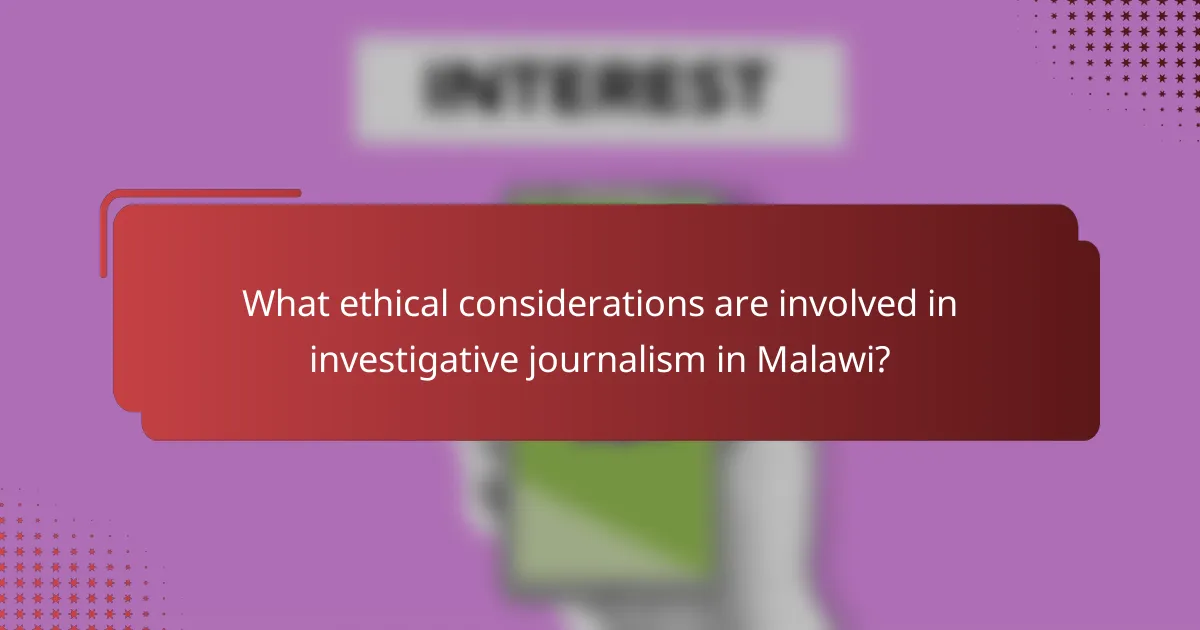
What ethical considerations are involved in investigative journalism in Malawi?
Investigative journalism in Malawi involves several ethical considerations. Journalists must prioritize accuracy and truthfulness in their reporting. This is crucial in a context where misinformation can lead to public harm. They also need to ensure the protection of sources to maintain confidentiality. This is particularly important in a country where whistleblowers may face repercussions.
Additionally, journalists should avoid conflicts of interest that could compromise their integrity. They must balance the public’s right to know with the potential impact of their findings on individuals and communities. Ethical guidelines discourage sensationalism, advocating for responsible reporting that respects the dignity of all subjects involved.
Malawi’s legal framework also influences these ethical considerations, as laws regarding defamation and freedom of expression can affect journalistic practices. Overall, ethical investigative journalism in Malawi requires a commitment to responsible reporting that safeguards both the public interest and individual rights.
How do journalists balance public interest and privacy?
Journalists balance public interest and privacy by adhering to ethical guidelines and legal standards. They assess the significance of the information to the public’s right to know. Journalists often consider the potential harm to individuals involved. They weigh the benefits of disclosure against the risks of infringing on personal privacy. Ethical codes, such as those from the Society of Professional Journalists, emphasize minimizing harm. In Malawi, journalists face unique challenges due to political and social dynamics. They must navigate cultural sensitivities while fulfilling their role as informers. Ultimately, the balance requires careful judgment and a commitment to ethical reporting practices.
What ethical guidelines should journalists follow in Malawi?
Journalists in Malawi should adhere to ethical guidelines that promote accuracy, fairness, and integrity. They must verify information before publication to ensure factual accuracy. Journalists should respect the privacy of individuals and avoid publishing sensitive information without consent. They must strive for balance and impartiality, presenting multiple viewpoints in their reporting. Transparency about sources and potential conflicts of interest is crucial for maintaining credibility. Journalists should avoid sensationalism and strive to report responsibly, especially on sensitive issues. Upholding these guidelines fosters trust and accountability in the media landscape of Malawi.
How can journalists navigate potential conflicts of interest?
Journalists can navigate potential conflicts of interest by maintaining transparency about their affiliations. They should disclose any relationships that could influence their reporting. This includes financial ties, personal connections, or prior engagements with subjects of their stories. Adhering to a strict code of ethics is crucial. Many journalism organizations provide guidelines for ethical reporting. These guidelines often emphasize the importance of objectivity and impartiality. Journalists can also seek editorial review from colleagues to ensure unbiased reporting. Regular training on ethics can further enhance a journalist’s ability to identify and manage conflicts of interest.
What challenges do investigative journalists face regarding ethics?
Investigative journalists face several ethical challenges, including conflicts of interest, pressure from sources, and the need for truthfulness. Conflicts of interest can arise when journalists have personal ties to the subjects they investigate. This can compromise their objectivity and integrity. Pressure from sources may lead journalists to compromise their ethical standards to maintain relationships. Journalists must also navigate the balance between public interest and individual privacy rights. Additionally, the pursuit of truth can sometimes lead to ethical dilemmas regarding the use of deception or hidden methods. In Malawi, these challenges are compounded by a lack of legal protection for journalists. According to the Committee to Protect Journalists, many journalists face threats and harassment, which can further complicate ethical decision-making.
How do threats to safety and security impact ethical reporting?
Threats to safety and security significantly impact ethical reporting. Journalists may face intimidation, violence, or harassment, which can lead to self-censorship. This self-censorship undermines the integrity of reporting. When journalists fear for their safety, they may avoid covering sensitive issues. This avoidance can result in incomplete narratives and a lack of accountability. In Malawi, threats have historically stifled press freedom. For instance, the 2011 protests against the government led to increased violence against journalists. Such conditions create a chilling effect on the media landscape. Ethical reporting requires a safe environment for journalists to operate effectively.
What role does media ownership play in ethical dilemmas?
Media ownership significantly influences ethical dilemmas in journalism. Ownership can dictate editorial policies and influence content. For instance, media owners may prioritize profit over journalistic integrity. This can lead to biased reporting or suppression of critical stories. In Malawi, ownership structures often reflect political affiliations. Such affiliations can compromise the objectivity of investigative journalism. Research shows that media outlets with strong political ties tend to exhibit less independence. This creates ethical challenges for journalists seeking to report truthfully.
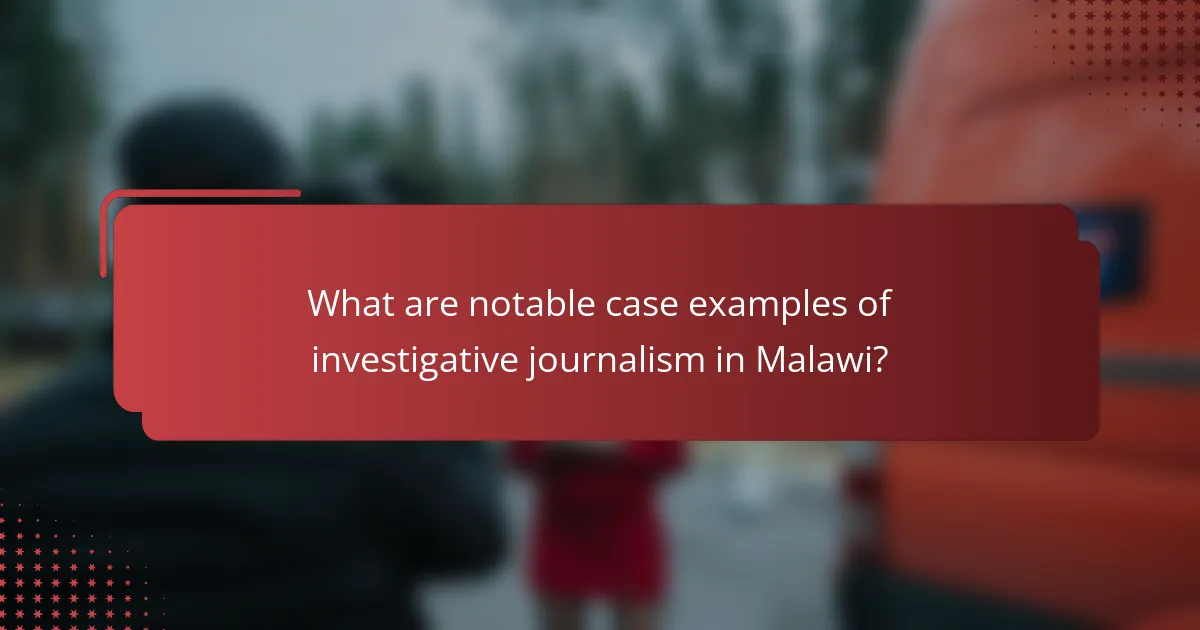
What are notable case examples of investigative journalism in Malawi?
Notable case examples of investigative journalism in Malawi include the 2011 cashgate scandal. This scandal involved the misappropriation of public funds amounting to over $30 million. Journalists uncovered evidence of corruption within government ministries. Their investigations led to high-profile arrests and increased public awareness of financial misconduct. Another significant case is the exposure of illegal logging activities in the country’s forests. Reports highlighted the involvement of government officials in these activities. Investigative efforts resulted in policy changes aimed at protecting Malawi’s natural resources. These examples illustrate the crucial role of investigative journalism in promoting accountability in Malawi.
What are some successful investigations that have made an impact?
Successful investigations in Malawi include the 2011 Cashgate scandal. This investigation revealed massive government corruption involving the embezzlement of public funds. Journalists uncovered evidence that led to the prosecution of several high-ranking officials. The scandal prompted significant reforms in financial management within the government. Another impactful investigation was the 2016 case involving the abuse of power by police officials. This investigation highlighted human rights violations and led to calls for police reform. These investigations have fostered greater public awareness and accountability in governance.
How did the ‘Malawi Cashgate’ scandal unfold through investigative journalism?
The ‘Malawi Cashgate’ scandal unfolded through investigative journalism by revealing systemic corruption in government financial management. Journalists conducted thorough investigations, analyzing financial records and interviewing whistleblowers. Reports published in major outlets exposed the misappropriation of public funds, amounting to over $30 million. Investigative teams collaborated with international organizations to validate findings. The media’s role prompted public outcry and government accountability. Subsequent parliamentary inquiries were initiated due to the reports. Investigative journalism was crucial in bringing transparency to the scandal. This led to legal actions against implicated officials and reforms in financial oversight.
What lessons can be learned from the ‘Malawi Electoral Commission’ investigation?
The Malawi Electoral Commission investigation highlights the importance of transparency in electoral processes. It shows that clear communication can enhance public trust. Ensuring accurate voter registration is crucial to prevent disputes. The investigation also emphasizes the need for independent oversight to maintain integrity. Additionally, it reveals the impact of timely reporting on electoral issues. Journalistic scrutiny can lead to accountability among officials. Lastly, the investigation underscores the role of civic engagement in fostering democratic practices.
What are the implications of these case examples for future journalism?
The implications of these case examples for future journalism include the need for increased transparency and accountability. Investigative journalism in Malawi showcases the importance of exposing corruption and malpractice. These case examples highlight the effectiveness of collaborative efforts among journalists. They also emphasize the necessity of robust legal protections for journalists. Furthermore, the cases illustrate the role of technology in enhancing investigative techniques. The experiences shared reveal the potential for citizen journalism to complement traditional media. Overall, these implications suggest a path towards more resilient and impactful journalism in Malawi.
How can these cases inspire new generations of journalists?
These cases can inspire new generations of journalists by showcasing the impact of investigative work. They highlight the importance of uncovering truths in challenging environments. For example, the investigative efforts that led to significant policy changes demonstrate the power of journalism. Such cases illustrate how dedicated reporting can hold authorities accountable. They also provide practical examples of techniques used in successful investigations. Young journalists can learn about ethical considerations from these cases. Learning from real-world examples prepares them for future challenges. Overall, these cases serve as a motivational blueprint for aspiring journalists.
What best practices can be adopted from these investigations?
Best practices in investigative journalism include thorough research and fact-checking. Journalists should verify information from multiple sources. Transparency with sources enhances credibility. Maintaining ethical standards is crucial to build trust with the audience. Training in legal rights helps journalists navigate potential challenges. Collaboration with other journalists can strengthen investigations. Utilizing technology for data analysis can uncover hidden patterns. Engaging with the community fosters a deeper understanding of local issues. These practices ensure comprehensive and responsible reporting.
What practical tips can aspiring investigative journalists in Malawi follow?
Aspiring investigative journalists in Malawi should focus on building strong research skills. They must learn to gather information from credible sources. Networking with experienced journalists is crucial for mentorship and guidance.
Understanding local laws and regulations regarding journalism is essential. This knowledge helps navigate legal challenges effectively. Developing a keen sense of observation aids in uncovering hidden stories.
Practicing ethical journalism fosters trust with sources and the public. Utilizing digital tools for data collection enhances investigative efforts. Attending workshops and training sessions can improve investigative techniques.
Investigative journalism in Malawi is a critical practice aimed at uncovering hidden truths related to corruption, human rights abuses, and environmental issues. This article provides an overview of the techniques employed by investigative journalists, the ethical considerations they face, and notable case examples that illustrate the impact of their work. Key topics include the historical development of investigative journalism in Malawi, the role of public records and interviews in investigations, and the challenges posed by the political landscape. Additionally, the article discusses best practices and practical tips for aspiring journalists, emphasizing the importance of transparency, accountability, and the use of technology in enhancing investigative efforts.
